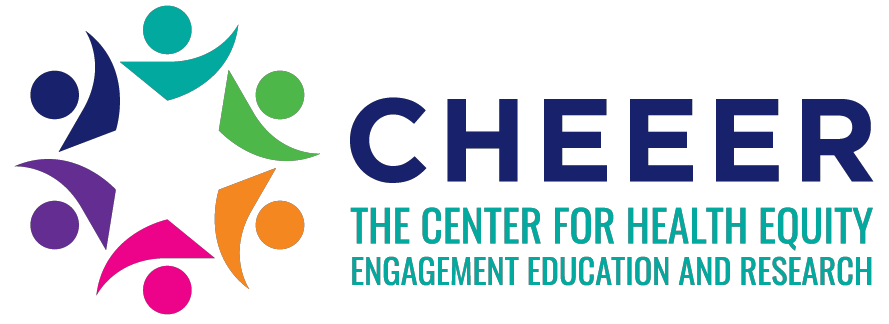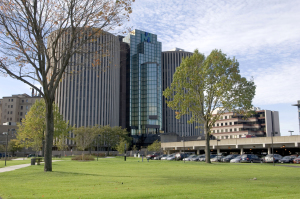by Da’Na Langford, Center for Health Equity Engagement Education and Research ThinkTank member, Certified Nurse Midwife
I recently had the opportunity to travel to Africa on vacation. My destinations included Accra, Ghana, Capetown, Hoedspruit, and Johannesburg, South Africa, and Victoria Falls, Zimbabwe. To say this was an amazing experience would be an understatement.
My first stop was Accra, Ghana. To get off the plane and walk into a sea of people that looked like me felt like I was officially home. I had heard the stereotypes in the past that Africans don’t relate to other black people and think they are better than Black Americans. This was never a feeling I experienced on my vacation. The citizens were welcoming and they enjoyed sharing their culture. We sat with multiple strangers to learn their culture as they asked questions about ours. We met some that longed to visit America (and move to America) for what they presumed would be a move of opportunity and financial advancement. We also met some who were turned off by what they equated to being “American,” including being spoiled and not working hard for anything. The residents were open, and everyone we met took the opportunity to inform us where we should visit and what parts of the city would enhance our vacation. This was the first time I had experienced being a majority of the population and it felt good. To be in a situation where I did not feel like I needed to watch my boisterous tone, my excessive use of talking with my hands, my expressiveness, the words I used and the tone in which I used them; it felt like a weight had been lifted off my shoulders. This is one of the few times I have not felt the need to daily “code switch.” If you are a person for whom “code switching” is a daily requirement, you understand the stress and strain this places on your body physically and mentally. These days in Africa were the first time I felt whole and healthy.
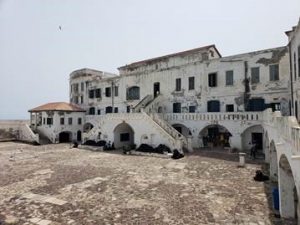
While in Accra, we visited a few tourist sites including W.E.B. Dubois museum, Kwame Nkrumah Mausoleum and Memorial Park, and a market to list a few. The one that was life changing, as well as soul and gut wrenching would be what white people call the slave castles and black people call slave dungeons on the Cape Coast. This was an emotional experience that placed me closer to my ancestors than I have ever felt before. To witness the place where my ancestors were beaten, forced to sit in their own (and others) vomit and feces, raped and killed was an experience every individual should be forced to encounter to understand the lasting effects and generational trauma of slavery, just as some individuals have required black people in America to sit with and “get over” enslavement and torture. At one point, the tour guide asked us to stand in the chambers where slave women were held for punishment after they fought off a slave owner’s rape attempt. This dungeon was small in size, with one hole in the floor for a toilet. This room was always packed wall to wall, dark and hot, with women forced to wear the same clothes for months at a time even while menstruating. While in this chamber, I felt like my ancestors had decided to place their hands around my neck and squeeze. I panicked and it felt as though I could not breathe. Although it only lasted a few seconds, I knew my ancestors had decided to give me a life experience as close to the near death experiences they were forced to face every day.
The next cities of Capetown and Johannesburg were filled with days of tourist stops. The most meaningful for me here was Robben Island where Nelson Mandela spent nearly 13 years in prison for challenging the establishment and status quo of apartheid (the governmental/official policies and system of segregation and discrimination on grounds of race.)
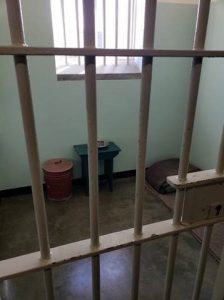
Looking into the 7 x 9 foot cell this great hero was forced to live in was knee-buckling and soul-searing. The guides on this tour were previous inmates of this prison, who also tell their own stories of time spent behind the walls and listening to these men was like watching PTSD in action. To hear their dialect and words and watch their actions while telling the stories was to watch the effects of institutionalization. I could literally hear the scars of these black men who were forced to spend unprecedented and unfair sentences behind prison walls. At one point during the tour, a gentleman we were traveling with turned to us to say, “I just want to walk up to him, hug him, give him money and remind him that he is free and that he does not have to be here anymore.”
In Johannesburg, visiting Nelson Mandela’s home was definitely a highlight. Placing my hands over the bullet holes that are still present after hateful individuals shot into his home where his wife and children lived is etched in my memories today. Learning the story of Hector Pieterson and the other children who led a movement in Soweto protesting the enforced teaching in Afrikaans, (the language of the white residents, not the local language spoken in Soweto) brought me to tears. Hector Pieterson was gunned down during this protest as police
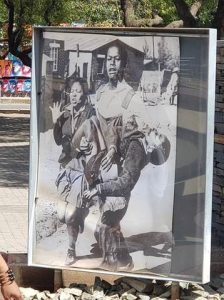
opened fire on school aged children, using phrases like “[protestors] were out of control” and “police feared for their lives” to defend their actions (reminiscent of language we’ve heard here in America as well). A photographer captured the moment a fellow protester picked up his lifeless body and attempted to run to safety and medical attention, all with Hector’s sister by his side. This picture became infamous all over the world and represented children attempting to stand up for rights in their own education. In 2002, a museum was opened near the location he was killed.
While the rest of the trip and all of the cities changed my life in some shape or form, I wanted to highlight the racial aspect. I believe we are forced in America to remain resilient. We are forced as black people to wake up every day and live life while ignoring the generational trauma that started at the point of being kidnapped from Africa. This trauma continues to grow with each generation in black families. We are forced to ignore the mental and physical effects of this, all the while living stronger and working harder to be treated as 3/5 a citizen. The traumatic effects have even forced some black people to internalize racism and separate themselves from the black experience because they don’t want to be associated with being black. We are forced to internalize the anger, the despair and sadness to the point where it is literally killing us through turmoil inflicted on our body systems. We see this in all of the racial health disparities that exist like h increased rates of hypertension, diabetes, heart disease, maternal mortality and infant mortality.
It is my charge to all black people, to first and foremost acknowledge this generational trauma, along with the daily traumas and chronic stress that we endure. We went from kidnappings, beatings and rape, to chain gangs, which continued to build an economy that showed us no benefit, to Jim Crow representing separate but equal, to today where social media has displayed the true discrimination and prejudices we face daily. Barbequing while black, shopping while black, being in Starbucks while black, driving while black, the list goes on and on. Then add intersectional discrimination for black women on top of it all. After acknowledging, we should put the burden on white people to fix the problems. It is not your responsibility to constantly be forced to educate and explain. It is their responsibility to do the work and right the wrongs. We carry a heavy enough load, it’s time to lighten our load and live healthier, longer lives by acknowledging, releasing and healing.
